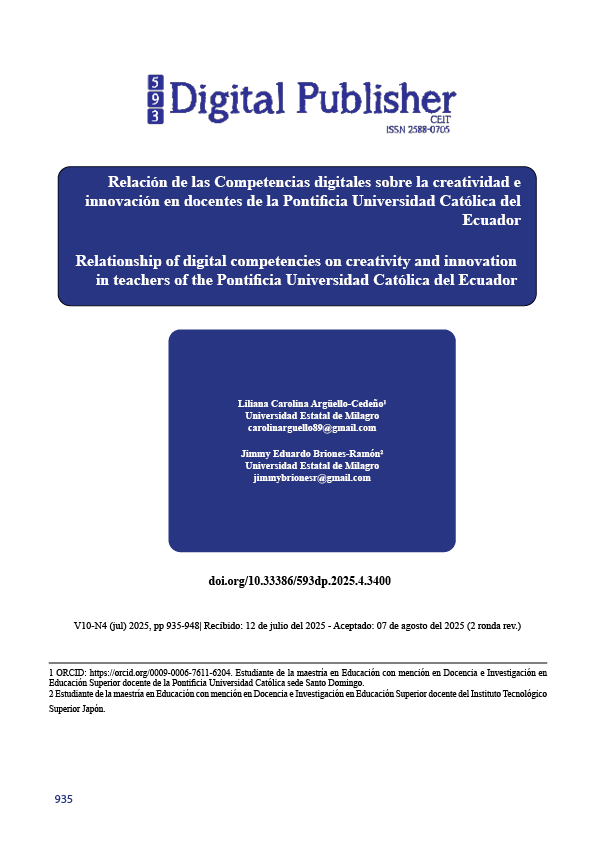Relationship of digital competencies on creativity and innovation in teachers of the Pontificia Universidad Católica del Ecuador
Main Article Content
Abstract
The transformation of educational environments driven by digital technologies has introduced new demands on university teaching, establishing digital competencies as a strategic component for promoting creative and innovative pedagogical practices. This study analyzed the relationship between the development of digital competencies and the capacities for creativity and innovation among faculty at the Pontifical Catholic University of Ecuador. A quantitative approach was applied, using a non-experimental, cross-sectional design with a correlational-explanatory scope. The sample consisted of 226 faculty members who responded to a structured 48-item questionnaire adapted to the Ecuadorian context. Statistical analysis included Student’s t-tests, exploratory factor analysis, Cronbach’s alpha, and multiple linear regression. The results revealed a statistically significant predictive model (R = 0.875; p < 0.001), in which the dimensions of Communication and Collaboration (β = 0.415) and Digital Citizenship (β = 0.388) emerged as the most influential predictors of teaching creativity and innovation, followed by Access and Use of Information (β = 0.139). No significant effect was found for the dimension Technology and Literacy. Additionally, significant differences were identified based on gender and academic level, with higher scores observed among female faculty and those holding master’s degrees. It is concluded that complex digital competencies have a direct impact on teaching creativity and innovation, highlighting the need to strengthen these dimensions through inclusive and context-sensitive professional development strategies within the university setting.
Downloads
Article Details

This work is licensed under a Creative Commons Attribution-NonCommercial-ShareAlike 4.0 International License.
1. Derechos de autor
Las obras que se publican en 593 Digital Publisher CEIT están sujetas a los siguientes términos:
1.1. 593 Digital Publisher CEIT, conserva los derechos patrimoniales (copyright) de las obras publicadas, favorece y permite la reutilización de las mismas bajo la licencia Licencia Creative Commons 4.0 de Reconocimiento-NoComercial-CompartirIgual 4.0, por lo cual se pueden copiar, usar, difundir, transmitir y exponer públicamente, siempre que:
1.1.a. Se cite la autoría y fuente original de su publicación (revista, editorial, URL).
1.1.b. No se usen para fines comerciales u onerosos.
1.1.c. Se mencione la existencia y especificaciones de esta licencia de uso.
References
Akour, M., & Alenezi, M. (2022). Higher Education Future in the Era of Digital Transformation. Education Sciences, 12(11), 784. https://doi.org/10.3390/educsci12110784
Aparicio-Gómez, O.-Y., Ostos-Ortiz, O.-L., & Von Feigenblatt, O. F. (2023). Competencia digital y desarrollo humano en la era de la Inteligencia Artificial. Hallazgos, 20(40), 217–235. https://doi.org/10.15332/2422409X.9254
Arregui-Valdivieso, V. P., Adum-Lípari, M. N., Cruz-Tamayo, M. de los Á., & Guilcapi-Lunavictoria, D. O. (2024). Estado actual de las competencias digitales en la educación superior: Un enfoque basado en el modelo PRISMA. Revista de Ciencias Sociales, 30, 257-268. https://doi.org/10.31876/rcs.v30i.42842
Avsec, S., Jagiełło-Kowalczyk, M., Żabicka, A., Gawlak, A., & Gil-Mastalerczyk, J. (2023). Leveraging Systems Thinking, Engagement, and Digital Competencies to Enhance First-Year Architecture Students’ Achievement in Design-Based Learning. Sustainability, 15(20), 15115. https://doi.org/10.3390/su152015115
Betancur Chicué, V. (2024). El microlearning y la teoría cognitiva del aprendizaje multimedia en el desarrollo de competencias digitales de docentes universitarios [Universidad de Salamanca]. https://doi.org/10.14201/gredos.159611
Burgos-Videla, C. G., Castillo Rojas, W. A., López Meneses, E., & Martínez, J. (2021). Digital Competence Analysis of University Students Using Latent Classes. Education Sciences, 11(8), 385. https://doi.org/10.3390/educsci11080385
Cabero-Almenara, J., & Palacios-Rodríguez, A. (2020). Marco Europeo de Competencia Digital Docente «DigCompEdu». Traducción y adaptación del cuestionario «DigCompEdu Check-In». EDMETIC, 9(1), 213–234. https://doi.org/10.21071/edmetic.v9i1.12462
Chai, C. S., Ling Koh, J. H., Tsai, C.-C., & Lee Wee Tan, L. (2011). Modeling primary school pre-service teachers’ Technological Pedagogical Content Knowledge (TPACK) for meaningful learning with information and communication technology (ICT). Computers & Education, 57(1), 1184–1193. https://doi.org/10.1016/j.compedu.2011.01.007
Cortesi, S. C., Hasse, A., Lombana, A., Kim, S., & Gasser, U. (2020). Youth and Digital Citizenship+ (Plus): Understanding Skills for a Digital World. SSRN Electronic Journal. https://doi.org/10.2139/ssrn.3557518
de Juana-Espinosa, S. A., Brotons, M., Sabater, V., & Stankevičiūtė, Ž. (2023). An analysis of best practices to enhance higher education teaching staff digital and multimedia skills. Human Systems Management, 42(2), 193–207. https://doi.org/10.3233/HSM-220060
Esteve-Mon, F. M., Llopis-Nebot, M. A., & Adell-Segura, J. (2020). Digital Teaching Competence of University Teachers: A Systematic Review of the Literature. IEEE Revista Iberoamericana de Tecnologias Del Aprendizaje, 15(4), 399–406. https://doi.org/10.1109/RITA.2020.3033225
Gcabashe, N. B., & Ndlovu, N. S. (2022). Exploring Business Studies Teachers’ Technology Self-Efficacy on their Technology Integration to Create Learner-Centred Teaching Environment. International Journal of Learning, Teaching and Educational Research, 21(12), 238–259. https://doi.org/10.26803/ijlter.21.12.13
Gentile, M., Città, G., Perna, S., & Allegra, M. (2023). Do we still need teachers? Navigating the paradigm shift of the teacher’s role in the AI era. Frontiers in Education, 8. https://doi.org/10.3389/feduc.2023.1161777
Instituto Nacional de Tecnologías Educativas y Formación del Profesorado (INTEF). (2017). Marco común de competencia digital docente. http://aprende.intef.es/mccdd
Ivankova, N. V., & Stick, S. L. (2007). Students’ Persistence in a Distributed Doctoral Program in Educational Leadership in Higher Education: A Mixed Methods Study. Research in Higher Education, 48(1), 93–135. https://doi.org/10.1007/s11162-006-9025-4
Jekabsone, I., & Anohina-Naumeca, A. (2024). The role of universities in enabling open innovation through the development of digital competence of faculty. Journal of Open Innovation: Technology, Market, and Complexity, 10(4), 100409. https://doi.org/10.1016/j.joitmc.2024.100409
Lo, N. P.-K. (2024). The Confluence of Digital Literacy and Eco-Consciousness: Harmonizing Digital Skills with Sustainable Practices in Education. Platforms, 2(1), 15–32. https://doi.org/10.3390/platforms2010002
Moreira-Choez, J. S., Lamus de Rodríguez, T. M., Arias-Iturralde, M. C., Vega-Intriago, J. O., Mendoza-Fernández, V. M., Zambrano-Acosta, J. M., & Cardenas-Hinojosa, R. D. (2024). Influence of gender and academic level on the development of digital competencies in university teachers: a multidisciplinary comparative analysis. Frontiers in Education, 9. https://doi.org/10.3389/feduc.2024.1436368
Moreira-Choez, J. S., Lamus de Rodríguez, T. M., Cedeño Barcia, L. A., & Bueno Fernández, M. M. (2024). Competencias digitales en docentes de educación superior: Un análisis integral basado en una revisión sistemática. Revista de Ciencias Sociales, 30(3), 317–331. https://doi.org/10.31876/rcs.v30i3.42672
Moreira-Choez, J. S., Zambrano-Acosta, J. M., & López-Padrón, A. (2024). Digital teaching competence of higher education professors: self-perception study in an Ecuadorian university. F1000Research, 12, 1484. https://doi.org/10.12688/f1000research.139064.2
Nebot, M. Á. L., Cosentino, V. V., Esteve-Mon, F. M., & Segura, J. A. (2021). Diagnostic and educational self-assessment of the digital competence of university teachers. Nordic Journal of Digital Literacy, 16(3–4), 115–131. https://doi.org/10.18261/issn.1891-943x-2021-03-04-03
Pettersson, F. (2018). On the issues of digital competence in educational contexts – a review of literature. Education and Information Technologies, 23(3), 1005–1021. https://doi.org/10.1007/s10639-017-9649-3
Rafi, M., JianMing, Z., & Ahmad, K. (2019). Technology integration for students’ information and digital literacy education in academic libraries. Information Discovery and Delivery, 47(4), 203–217. https://doi.org/10.1108/IDD-07-2019-0049
Sereño Ahumada, F. (2024). La formación docente en la era digital: práctica reflexiva, aprendizaje situado e inteligencia artificial. Revista Ensayos Pedagógicos, 19(2), 1–15. https://doi.org/10.15359/rep.19-2.7
Valverde-Berrocoso, J., Fernández-Sánchez, M. R., Revuelta Dominguez, F. I., & Sosa-Díaz, M. J. (2021). The educational integration of digital technologies preCovid-19: Lessons for teacher education. PLOS ONE, 16(8), e0256283. https://doi.org/10.1371/journal.pone.0256283
Veloza Gamba, R. (2023). Desarrollo de la inteligencia emocional en el contexto de las competencias digitales en el uso de las redes sociales en los sistemas educativos latinoamericanos: una revisión documental. LATAM Revista Latinoamericana de Ciencias Sociales y Humanidades, 4(1). https://doi.org/10.56712/latam.v4i1.482
Vilchez Guizado, J., & Ramón Ortiz, J. Á. (2022). Retos digitales del profesorado en gestión de la enseñanza virtual de matemáticas. Revista Venezolana de Gerencia, 27(Edición Especial 7), 390–408. https://doi.org/10.52080/rvgluz.27.7.26
Winter, E., Costello, A., O’Brien, M., & Hickey, G. (2021). Teachers’ use of technology and the impact of Covid-19. Irish Educational Studies, 40(2), 235–246. https://doi.org/10.1080/03323315.2021.1916559



